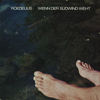Roedelius, "Wenn der Südwind weht"
 Despite being best known for being half of Cluster, Hans-Joachim Roedelius’ career outside of that group has been even more prolific. Throughout the '80s he released as many albums as I have fingers and most of them are out of print. Thankfully Bureau B are continuing their amazing job of reissuing the Cluster-related back catalogue with this and a Dieter Moebius solo effort out this month. Here Roedelius is in fine form, surpassing himself with this fine selection of melodious pieces. Mixing a very ear-friendly approach to music making with some genuinely thrilling sounds, this album is one of the best things he’s put his name to (even beating all but the most classic releases he’s been associated with).
Despite being best known for being half of Cluster, Hans-Joachim Roedelius’ career outside of that group has been even more prolific. Throughout the '80s he released as many albums as I have fingers and most of them are out of print. Thankfully Bureau B are continuing their amazing job of reissuing the Cluster-related back catalogue with this and a Dieter Moebius solo effort out this month. Here Roedelius is in fine form, surpassing himself with this fine selection of melodious pieces. Mixing a very ear-friendly approach to music making with some genuinely thrilling sounds, this album is one of the best things he’s put his name to (even beating all but the most classic releases he’s been associated with).
Opening the album, the title piece calls to mind the softer parts of Harmonia’s Deluxe or the works of Brian Eno (either in collaboration with Cluster or not). The beautiful synthesiser rhythm has a dreamy quality which plays well against the second synthesiser part that explores the full tonal range of the piece. The quivering high notes are like mechanical birdsong in a clockwork forest. “Veilchenwurzein” immediately follows along the same path, interlocking melodies and soaring lead lines creating a beautiful and rich sonic landscape. Roedelius could easily pursue an entire album in this vein and keep me very happy but, forever restless in his creativity, Wenn der Südwind weht is an even better album for its variety.
Roedelius pushes his music outside the territory he and Moebius usually occupy with Cluster. On “Freudentanz” the music truly lives up the title (“joy-dance” being my approximate translation of the title) with more than a little Chuck Berry breaking into the normally unearthly electronic body of Roedelius’ work. In a complete about-turn in terms of mood, “Saumpfad” takes the more ambient approach explored by Roedelius in his previous solo albums and takes it to a darker, more intimidating place. The deep pulse at the centre of the piece has an evil heartbeat character to it, a murmur in the cosmic electrocardiogram.
With Wenn der Südwind weht Roedelius has simultaneously consolidated his previous approaches to his music and opened a number of new paths for him to investigate in later years. Each of the tracks is a miniature masterpiece, capturing both the time the music was created in and the endless possibilities of the future. Like Cluster’s final albums prior to going on hiatus, Wenn der Südwind weht is a document of unbridled exploration that resonates as loudly today as ever.
samples:



